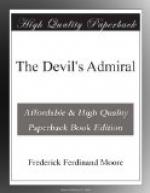“There is no escape from here,” said Riggs. “They hold the ship now, and they’ll scuttle her before day comes.”
I struck a match and lit the swinging slush-lamp, which made a dismal, smoking flame and added to the heat and the multitude of smells which made the forecastle a hole of torture. But the light was comforting, and Rajah crept to his master’s side and clung to his arm, the boy’s mouth open and his eyes full of questions.
“So they got poor Harris,” said Riggs, still sitting on the chest and gazing at the body of the mate. “I told him not to come down, but he would have his way. I thought I could get down here and find one of his pistols.”
“They are gone,” I told him. “I made a search for them, and was about to get out of here when I heard Rajah coming down. It is lucky I didn’t kill the boy—or that he didn’t kill me. But that’s all done and over, captain, and we ought to begin to plan for our escape. Is there no way out of here?”
He put his pallid face in his hands and shook his head, and it was then that I realized his age and his helplessness. He had given up the fight.
“You don’t realize our situation, Mr. Trenholm, or what all this means, or the men we are against. That forecastle bulkhead is lined with sheet-iron on the other side to keep the crews from broaching cargo, and, even if we should cut through it, we would come against cargo in the hold, and would be no better off. I admire your pluck, but you don’t know the odds against us. They’ll loot her and scuttle her before the sun is well up, and we’ll go down in this trap. Help me lift poor Harris into a bunk.”
We stowed the body of the mate in a lower bunk and covered it with straw and some of the clothing of the Chinese. Riggs sat down again and stared at the littered deck.
“But we must fight to the last minute,” I said. “We can’t give up like this, even if we are trapped. You certainly do not intend to surrender now. I know, captain, that the odds are great; but we can fight, can’t we?”
“You don’t know!” he almost wailed, beating his knees with his hands. “You don’t know what it all means, of course. I tell you they’ll loot her and scuttle her when they have done their work aboard, and we’re doomed men!”
“But what is there to loot in this old tub?” I asked, preferring to have him tell me of the mysterious cargo than to take the time of explaining how I had followed him and Harris below.
“That’s what they want,” he said, talking to himself more than to me. “Harris was right, but we found out too late. They got Mr. Trego before he could warn us. And it’s not my fault if I die for it. Me, J. Riggs, master of sail and steam for thirty years, and never a ship lost nor a dishonest dollar in all my life, not to know what’s in my ship!
“It’s not me that lost her, God knows; but that’s what the owners will say, and that’s what everybody will say—if they don’t say something worse when the truth comes out. ‘Riggs gone, and his ship gone,’ they’ll say, and then others will wink and whisper: ’And you know the Kut Sang was ballasted with gold,’ and who’s to know I never stole it?”




